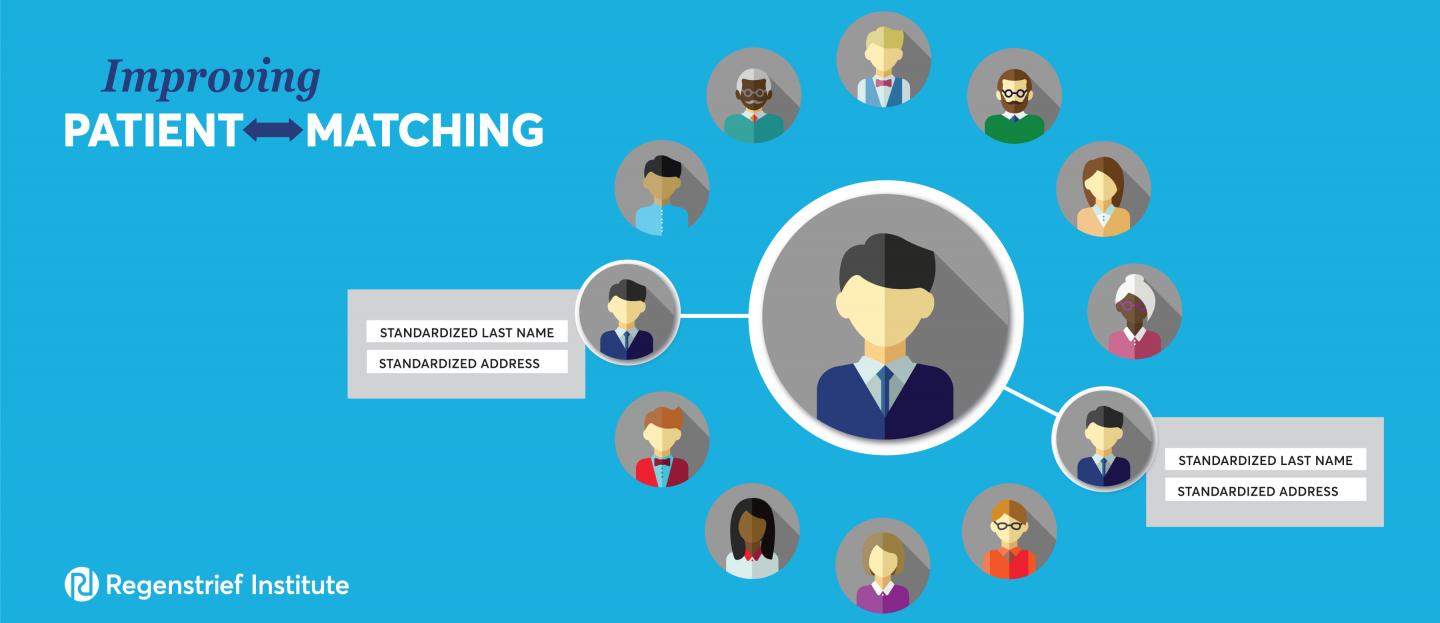
Credit: Regenstrief Institute
INDIANAPOLIS – Standardizing last names and address information can improve the linking of patient health records by as much as 8 percent — more than 2 billion records — and enhance data available to clinicians to inform their care decisions.
Researchers at Regenstrief Institute, Indiana University Richard M. Fairbanks School of Public Health at IUPUI, IU School of Medicine and The Pew Charitable Trusts added specific structure to a number of identifiers in health records and determined that addresses and last names were specific factors that improved matching.
In the paper, “Evaluating the effect of data standardization and validation on patient matching accuracy,” published online ahead of the May 2019 print issue of the Journal of the American Medical Informatics Association (JAMIA), lead author and Regenstrief research scientist Shaun Grannis, M.D., M.S., and his study team encouraged health IT vendors to prioritize incorporating address standardization using the U.S. Postal Service format. They also suggested that health IT policymakers explore strategies to encourage address standardization and provide more evidence of the value of data consistency.
“Address is a field rife for variation, so this is a great opportunity for standardization,” said Dr. Grannis, who is the director of the Regenstrief Center for Biomedical Informatics. “Standardizing data on a broader scale would ensure that patients and clinicians have better data on which to make decisions, which would enhance both the quality of care and patient safety.”
Data Standardization Can Improve Match Rates
Dr. Grannis and his team tested the effectiveness of recommendations for standardized demographic data on real-world data sets. They used these four health datasets to compare baseline matching accuracy to best-practice recommendations for four different scenarios. They tested standardized last names, telephone numbers, social security numbers, full birthdates, and addresses. After running the data, they determined that standardizing addresses had the greatest impact on data matching across all four use cases; last names had a smaller effect. However, both of those fields together created an even larger increase in accuracy and cut the number of unmatched records by nearly half. In the paper, authors estimated that there were 30 billion HL7 messages transmitted and in need of matching annually in the United States. An increase of 8 percent would mean more than 2 billion additional records would be matched to patients.
“This first-of-its-kind research shows that setting standards for demographic data–addresses in particular–could put a significant dent in health care’s perennial problem with correctly matching records for the same patient,” said Ben Moscovitch, project director of the health information technology initiative at The Pew Charitable Trusts. “Now it’s time for the federal government to require the standardization of data that help link an individual’s medical records–which is a key step to fully realizing the safer, well-coordinated care that electronic health records promise.”
The Patient Data Matching Problem
Patient matching is crucial for patient safety. Often, all of a person’s records are not matched together, leaving out crucial health information the provider may need. Sometimes, records for different people are mistakenly matched together, which leads to both safety and privacy concerns. All this happens because health information from different providers is stored independently, and there is no universal unique identification system to link them together.
Healthcare systems must rely on patient matching algorithms, which use patient demographics and other identifiers to link records. Those algorithms can be very effective. However, they require high-quality, standardized data to work well, and that data is often captured in different formats by each organization or system.
The importance of patient matching
According to a report from The Pew Charitable Trusts, patient matching is one of the barriers to enhanced interoperability — the ability of differing health information systems to exchange and make use of patient information. Better patient matching can eventually:
- Improve patient care and satisfaction
- Reduce costs for patients and providers
- Support innovation by tracking patient outcomes
- Detect fraud
The Pew report explored several options to improve how records are linked, including data standardization. The Pew Charitable Trusts funded this collaboration with Regenstrief to offer data in support of their recommendation. In addition to the paper published in JAMIA, Dr. Grannis discussed his findings at a Pew panel on the subject last year.
###
In addition to his appointment at Regenstrief Institute, Dr. Grannis is an associate professor of family medicine and the Clem McDonald Investigator in Biomedical Informatics at IU School of Medicine.
Other authors on this paper are Huiping Xu, Ph.D., a Regenstrief affiliate scientist from IU School of Medicine and Fairbanks School of Public Health; Joshua Vest, Ph.D., Regenstrief and Fairbanks School of Public Health; Suranga Kasthurirathne, Ph.D., Regenstrief and IU School of Informatics and Computing; Na Bo, M.S., IU School of Medicine; Ben Moscovitch, M.A., Rita Torkzadeh, M.S., and Josh Rising, M.D., from The Pew Charitable Trusts.
This work was supported by Pew Charitable Trusts grant number PEW30381.
Media Contact
John Erickson
[email protected]




